9 Best Musical Tony Winners That Have Never Been Revived on Broadway
For a Broadway musical, the highest honor around is the Best Musical Tony Award, an accolade that can help bring audiences from around the world to the show both on Broadway and on tour. The list of winners is a veritable who’s who of musical theatre classics, and theatre fans have been able to see most of them return to Broadway in major first-class revivals—sometimes multiple times.
But what about the Best Musical winners that haven’t returned to Broadway? We’re looking at nine Best Musical Tony winners that have yet to enjoy a major Broadway revival.
1. Redhead (1959)

1959’s Best Musical Redhead is bizarre to read about today; the story concerns a young woman, Essie Whimple, a sculptor in a wax museum in Victorian London preparing an exhibit on the murder of an American chorine by a Jack the Ripper-like serial killer that has been the talk of the town. There are a number of complicated twists and turns, culminating in Essie attempting to woo an actor she’s attracted to by pretending to be another victim of the chorine’s murderer. If you find that confusing, you’re not alone; Brooks Atkinson in his New York Times review called the book “as complicated as an income tax return and just about as entertaining,” but luckily he spent much of the rest of his review waxing poetic about leading lady Gwen Verdon’s performance. A particular highlight of the show was the tongue twister patter number “Erbie Fitch’s Twitch” which featured Verdon in Charlie Chaplin drag.
Despite the mixed reviews, Redhead won six 1959 Tony Awards, including Best Musical, Best Costume Design for Rouben Ter-Arutunian, and acting awards for Verdon, Leonard Stone, and Richard Kiley. It ran for over a year and followed up its 452-performance Broadway run with a brief U.S. tour. It has cropped up occasionally since then—notably at Goodspeed Opera House in Connecticut in 1998 and as a 2015 benefit concert for Theatre West in Hollywood—but otherwise Redhead’s success seems to have hinged upon the performance of its singular leading lady, without whom the show hasn’t had much of a significant afterlife.
2. Fiorello! (1959)
This musical by Jerry Bock, Sheldon Harnick, Jerome Weidman, and George Abbott features a slightly more conventional plotline than Redhead, telling the story of famed and beloved New York City Mayor Fiorello H. LaGuardia. The musical takes us through LaGuardia’s successful congressional campaign and his crusade against the corrupt Tammany Hall political machine all the way through his election to mayor of New York City, but it also presents a somewhat romanticized version of his love life. The production won three 1960 Tony Awards, including Best Musical (a tie with The Sound of Music), Best Direction for George Abbott, and best performance by a Featured Actor in a Musical for Tom Bosley, who played the title role. The piece also won the Pulitzer Prize for Drama.
And yet, the show has not seen a major revival in New York since its debut, outside of a few concert presentations and an Off-Broadway production earlier this season. When it opened on Broadway in 1959, LaGuardia was still very much a beloved figure, alive and present in the memories of all but the youngest theatregoers in the audience; he’d only even been out of office 14 years. While LaGuardia’s legacy is still felt today—perhaps primarily as the namesake behind a NYC airport and High School for the performing arts—this show might possibly be a case of a well-constructed work that just spoke more directly to the audience of its time.
3. Hallelujah, Baby! (1967)
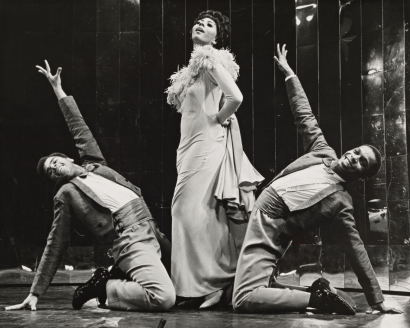
Hallelujah, Baby! was written by a team whose pedigree is about as good as it gets on Broadway; it featured a score by Jule Styne, Betty Comden, Adolph Green, and a book by Arthur Laurents. It tells the story of Georgina, a black woman who leaves her job as a maid in South Carolina to achieve stardom as a performer. The book takes her through the Great Depression, World War II, and the early civil rights movement, and by the end she’s a famous singer in an upscale night club. The show was planned for Lena Horne, but when Horne left the project, a then largely-unknown Leslie Uggams was cast in the leading role, and it made her a star; her Act I closer “Being Good Isn’t Good Enough” was a particular standout. It won five 1968 Tony Awards, including Best Musical and Best Score, with Uggams and Lillian Hayman taking winning performance awards.
The show has had little afterlife since its Broadway premiere, but in 2004, Laurents took the occasion of productions at George Street Playhouse in New Jersey and Arena Stage in D.C. to enact some revisions on the piece, including hiring Adolph Green’s daughter, Amanda Green, to supply some new lyrics. Laurents apparently felt that the original production had covered the black experience in the first half of the 20th century too lightly and he attempted to inject a more-authentic (and darker) tone, but with the Jule Styne score remaining rather exuberant, reviews of this revision were mixed.
4. Applause (1970)
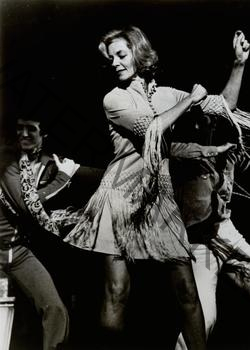
Applause’s writing team also included Betty Comden and Adolph Green, though this time as book writers, with Charles Strouse and Lee Adams (the team behind Bye Bye Birdie) supplying the score. It is based on Marry Orr’s short story The Wisdom of Eve and its better known film adaptation, All About Eve. Aging actress Margo Channing takes super-fan Eve Harrington under her wing as her assistant and understudy, only to have Eve attempt to steal her career and man right out from under her. Film star Lauren Bacall took on the role of Margo Channing in this version of the story that updated the setting to the then-modern day 1970s. The piece was somewhat edgy for its time; an early scene takes Channing to a Greenwich Village gay bar, and Applause opened less than a year after the Stonewall riots.
The show was a big hit, running for over two years and 896 performances and winning four 1970 Tony Awards, including Best Musical, Best Direction and Choreography for Ron Field, and Best Leading Actress for Bacall. A West End production followed, which became the basis of a television adaptation that was aired nationally on CBS in 1973. Since then, its only New York production of note was a concert staging by New York City Center’s Encores! in 2008, starring Christine Ebersole. As for why Applause hasn’t yet had a big Broadway revival, Ben Brantley in his New York Times review of the Encores! production wagered a guess: “Is this a show that is more than a period piece, a work destined to outlast the era of its birth? I say, regretfully but emphatically, no.”
5. Two Gentleman of Verona (1971)
This next entry on the list probably falls into the same category as Applause, having presented a then-modern 1970s spin on Shakespeare’s comedy of the same name. With music by Galt MacDermot (Hair), lyrics by John Guare and a book by Mel Shapiro and Guare, it should come as no surprise that this piece originated in 1971 as a summer offering in Central Park’s Delacorte Theatre, presented by the Public Theater’s New York Shakespeare Festival. The production was praised for its youthful exuberance and sweetness, both qualities that seemed to transfer along with the production when it opened on Broadway at the St. James a few months later.
The Broadway production had a healthy run of a year-and-a-half and 614 performances and it won 1972 Tony Awards for Best Musical and Best Book; it notably beat out both Grease and Follies for the top award, both of which have gone on to enjoy multiple Broadway revivals. The Public brought it back to the Delacorte in 2005 in a production that was warmly received, but many felt the show’s ’70s pop sensibility had not aged very well.
6. Raisin (1973)
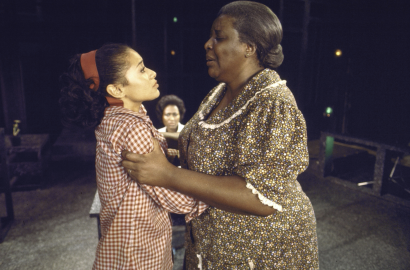
Another in a long list of musical adaptations that reduce their source materials’ titles down to a single word, Raisin takes its inspiration from Lorraine Hansberry’s classic 1959 play A Raisin in the Sun. It tells the story of a black family in 1951 Chicago that attempts to improve their situation after their father’s death leaves them with an insurance payout, ultimately purchasing a home. The show featured a score by Edwin Judd Woldin and Robert Brittan, with a book by Charlotte Zaltzberg and Robert B. Nemiroff, Hansberry’s former husband. It was received quite favorably; Clive Barnes in his New York Times review lauded the musical’s book as being “perhaps even better than the play [A Raisin in the Sun].”
It won two 1974 Tony Awards, including Best Musical and Best Actress for Virginia Capers, and it enjoyed a run of over two years and 847 performances, later launching a national tour. Since closing on Broadway in 1975, the work has only been seen in regional productions. It’s difficult to say why it hasn’t made a Broadway return. Perhaps it is ripe for a major revival, or perhaps the legacy of Hansberry’s seminal original work has just eclipsed that of its musical adaptation in the years following its premiere.
7. City of Angels (1989)
A love letter to the world of film noir, Larry Gelbart, Cy Coleman, and David Zippel’s City of Angels interweaves the dual stories of a black-and-white detective drama, and the Hollywood screenwriter who’s attempting to write it. The original production differentiated the two worlds by presenting the writer’s story in color and that of his detective character in black and white. It offered Cy Coleman, the composer behind such Broadway classics as Sweet Charity and Little Me, the opportunity to write his jazziest score yet.
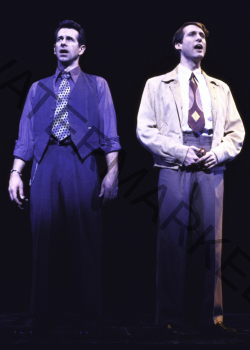
The reviews upon opening were mixed overall, but Frank Rich’s in the New York Times was a rave, and the show became a hit. It ran for two years and 879 performances. It won six 1990 Tony Awards, including Best Musical, Best Book and Score, and Best Scenic Design for Robin Wagner, while James Naughton and Randy Graff took home performance awards. The production spawned two national tours, a West End transfer, and even a West End revival at the Donmar Warehouse in 2014 that returns this year, but it has eluded Broadway since its premiere. It is a frequent entry on theatre fans’ wish lists of shows deserving of Broadway revivals.
8. The Will Rogers Follies (1991)
Cy Coleman was back on Broadway just a couple of years later with The Will Rogers Follies, which also featured a book by Peter Stone and lyrics by Betty Comden and Adolph Green. The show told the story of actor, vaudeville entertainer, cowboy, humorist, and newspaper columnist Will Rogers in a stylized presentation that dramatized major events in his life as Ziegfeld-esque production numbers. In a production directed and choreographed by Tommy Tune, the show was met with difficult reviews; Frank Rich writing in the New York Times called it “the most disjointed musical of this or any other season.”
And yet, it remained a hit for much of the first half of the 1990s. It ran for over two years and 981 regular performances and won six 1991 Tony Awards, including Best Musical, Best Score, Best Direction and Choreography, Best Costume Design for Willa Kim, and Best Lighting Design for Jules Fisher. The production went on to enjoy multiple national tours and a Branson production starring Pat Boone. Since then it has become a not-infrequent selection for regional, stock, and amateur companies, but it has yet to return to New York in any major revival.
9. Kiss of the Spider Woman (1993)
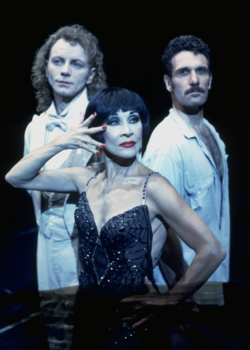
John Kander, Fred Ebb, and Terrence McNally’s Kiss of the Spider Woman is based on the Manuel Puig novel El Beso de la Mujer Araña (which literally translates to the musical’s English title). It tells the story of a gay window dresser who’s in a Latin American prison but escapes into a fantasy world revolving around movies and a certain movie star, Aurora. A Marxist revolutionary becomes his cellmate, and they forge an unlikely friendship. The musical started its life in a workshop production at SUNY Purchase, part of an ambitious program called New Musicals that unfortunately fizzled out soon after Spider Woman. It made its official premiere in Toronto, following this up with an award-winning West End debut, finally premiering on Broadway in 1993 in a production that starred Chita Rivera, Brent Carver, and Anthony Crivello.
The show received a mixed critical response, but it did quite well on Tony night. It won seven 1993 Tony Awards, including Best Musical, Best Book and Score, and Best Costume Design for Florence Klotz, with Rivera, Carver, and Crivello all taking home performance in awards in a near-sweep of the category. It ran for over two years and 904 performances and even received a rare second cast recording when the replacement cast members Howard McGillin, Vanessa Williams, and Brian Stokes Mitchell proved popular with audiences. The work has subsequently been seen in professional and amateur production around the world. Though a Broadway return hasn’t yet happened for Spider Woman, a reading was held in 2015 featuring Audra McDonald, Alan Cumming, and Steven Pasquale that had many wondering if a major revival might just be in the works. Only time will tell.



